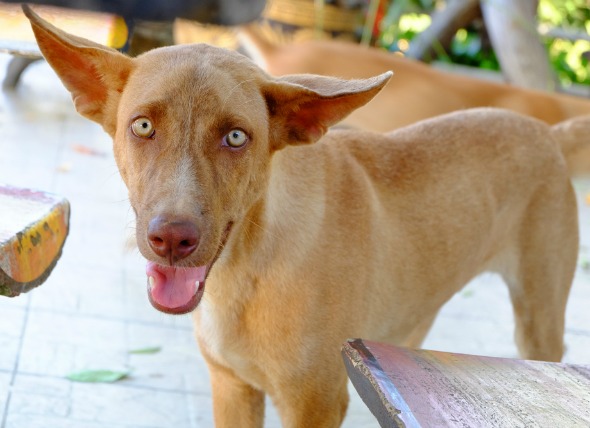
Inflammatory bowel disease is one of the most common causes of vomiting and chronic diarrhea in dogs. Immunoproliferative enteropathy, a disease that is related to an abnormally reactive immune system, affects the large or small intestine, the liver, the endocrine system, the kidneys, and the skin. The lining of the stomach becomes infiltrated through inflammatory cells, thereby obstructing the normal functions of absorption and digestion. Being an immune linked inflammation, it can also be responsible for making the body more vulnerable to bacterial infection, parasites, intestinal cancer, or dietary sensitivity. Loss of protein and severe intestinal malabsorption is commonly seen.
Genetic lymphocytic-plasmacytic enteritis has been observed in the Basenji breed, and is commonly referred to as immunoproliferative enteropathy in Basenjis. Basenji mixes are also at an increased risk. There is no gender differentiation, but it is more commonly seen when the dog is young to middle aged.
The symptoms of immunoproliferative enteropathy disorder are generally observed in young to middle aged Basenjis. Irregular bouts of severe diarrhea over a long period (chronic) of time, usually preceded by loss of appetite, is the most common symptom. Loss of weight is also very common as there is loss of protein and other essential nutrients through the gut. The conditions would get progressively worse without treatment, and might also lead to emaciation. Immunoproliferative enteropathy can also affect the skin, with symptoms that include ulcers on the margins of the ears, and hair loss (alopecia) on both sides of the body.
An episode may be linked to stressful events like travel, boarding, vaccination, or, for a female, being in heat (estrus). Although there are no proven causes for immunoproliferative enteropathy, there are often continuous periods of diarrhea that are associated with these types of stressful events (though not limited to the type of stressful event). This type of disorder is most commonly seen in the Basenji breed, with an assumption that there is a genetic base.
You will need to give a thorough history of your pet's health and onset of symptoms. A standard complete blood profile will be conducted, including a chemical blood profile, a complete blood count, and a urinalysis. The blood tests may show concurrent conditions of anemia if the immunoproliferative enteropathy is severe, or your dog may be suffering from hypoalbuminemia, an abnormally low amount of albumin -- a blood protein -- in the bloodstream.
There are several disorders that can cause intermittent diarrhea in dogs. Your veterinarian will conduct fecal tests and blood tests to check for parasites and bacterial infections, two of the most frequent causes of chronic diarrhea. An intestinal biopsy is also important for making a definitive diagnosis. This will involve surgical removal of a sample of tissue from the intestinal wall for examination. As immunosuppression is the primary treatment of inflammatory bowel disease, it is vital to rule out any possible infectious causes of several gastrointestinal (GI) diseases, like histoplasmosis, salmonella, or giardia.
There is no particular cure for immunoproliferative enteropathy disorder, but it can be controlled if the treatment is started early. The most important treatment option is dietary management with a special intestinal diet, which has all the necessary proteins sources without additives. Your veterinarian will take you and your dog through a course of dietary trials in order to find the foods that are the least disruptive to your dog's system. You will also need to avoid placing your dogs in stressful situations, as an episode of immunoproliferative enteropathy can be set off by stress.
As it is the hyperactive immune response which results in tissue damage and interferes with the normal functions of the intestines, the treatment is mainly aimed at restraining the response and decreasing the inflammation that may be present at the gastrointestinal region.
Prednisone or corticosteroids are useful for suppressing the overactive immune response, and antibiotics may be prescribed for any infections that are found. Your dog's condition will generally start improving in one to two weeks. At the follow-up visit, your veterinarian will assess your dog's response to the dietary changes and drug treatment, and will likely reduce the dose after a month or two in order to alternate day therapy.
It is highly recommended that your dog be neutered in order to avoid breedings, as this disorder is believed to be genetically inherited. It is also preferable that you avoid breeding your dog's parents, as well as any siblings.
 Inflammation of the Esophagus in Dogs
Esophagitis in Dogs
Gastrointestinal reflux, or a
Inflammation of the Esophagus in Dogs
Esophagitis in Dogs
Gastrointestinal reflux, or a
 Antibiotic-Resistant Infections in Dogs
Methicillin-Resistant Staph aureus (MRSA) Infection in D
Antibiotic-Resistant Infections in Dogs
Methicillin-Resistant Staph aureus (MRSA) Infection in D
 Paralysis in Dogs
Loss of Body Movement in Dogs
A dog’s abili
Paralysis in Dogs
Loss of Body Movement in Dogs
A dog’s abili
 Red Eye in Dogs
Inflammation of the Eye in Dogs
Red eye causes th
Red Eye in Dogs
Inflammation of the Eye in Dogs
Red eye causes th
 Spinal and Vertebral Birth Defects in Dogs
Congenital Spinal and Vertebral Malformations in Dogs
&n
Spinal and Vertebral Birth Defects in Dogs
Congenital Spinal and Vertebral Malformations in Dogs
&n
Copyright © 2005-2016 Pet Information All Rights Reserved
Contact us: www162date@outlook.com